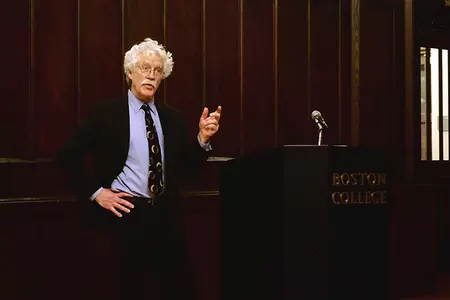Boston College Athletics

Faculty Appreciation: Thomas Kaplan-Maxfield
April 08, 2021 | Boston College Athletics, #ForBoston Files
One conversation is all it took to challenge and create indelible links and impressions.
I didn't really know what to expect when I was first assigned to stand up this Faculty Spotlight series.
Interviewing professors intrigued me, but I didn't really know what to expect. I was a lifelong sports fanatic, and I wasn't sure how I would relate to people whose lives didn't necessarily revolve around the same spheres as mine. I love interviewing people, but I was a little afraid that I would ask a question and reveal my own ignorance about the academic rigors of Boston College.
So I was probably surprised the most when each conversation triggered a wholly different part of my brain. What I thought were casual interviews ended in friendly conversation about passions, and the professors and lecturers that we've featured here resonated with me. The way they respected their students and enjoyed the responses shone through, and it was especially true when it came to the time balance of the athletes working towards their curriculum requirements and individual degrees.
I fell in love with writing this series, and it's now a treasured part of my month's coverage. The educators all obliterated this romantic stereotype of a buttoned-down, classroom professor imagined in some Hollywood movie by revealing caring, thoughtful people who love teaching, conversation and discussion. And that was maybe never more true than this month when I had the opportunity to sit and talk with Thomas Kaplan-Maxfield of BC's English department.
"To me, it's all about stories within stories within stories," Kaplan-Maxfield said. "It starts off with a symposium about a character and a story that's going on that you walked into, and when you walk into it, you're a character in the story. The same thing is happening in our lives - how we know how to come into a classroom and sit at a desk, how we were taught and how the people who taught them know that. In nonfiction, there's always a story and your job is to try and figure out what the story and genre is."
Our conversation revealed a novelist excelling at finding the triggers of independent thought. There's a more robust freedom encapsulating a generation of students who expanded their minds through the exploration of the human experience, and the full college campus was so much more than just a classroom or a syllabus. The formulaic approach was never going to be part of how Kaplan-Maxfield approached a classroom because the stories are what made things more amazing.
It was especially true for his own story. He became a teacher after performing a house repair for Paul Lewis, a fellow professor in the Boston College English department. A conversation following the minor work revealed Kaplan-Maxfield's desire to become a teacher, and Lewis helped see him on that way. Kaplan-Maxfield, who did his bachelor's and master's work at UMass-Boston, had completed his PhD at BC, and the interpersonal relationship helped spur him on a path that led to him becoming an Associate Professor of the Practice.
Those stories are the nonfiction side of life, and they became the bedrock for his classroom calling. His coursework focuses on the principles of love and indoctrination, and he explores the communal connections between people. The world helped build this nonfiction story to which we are all characters as opposed to a world where fictional characters ruled the roost.
"I always loved learning and reading and writing," Kaplan-Maxfield said, "but I find academia really conservative. I grew up in the 60s and graduated high school in 1970. I never wanted to go through all that kind of work to get published in academic journals. I was more interested in getting fiction published, and so I went in that direction. Now it's true that you can become a tenured faculty member, and the English department has tenured faculty who are fiction writers, but to me, teaching was what I loved about academia."
The passion for fiction was something I really honed in on because, to me, it built the larger picture of his whole story. He described his passion as a lifelong pursuit, a muse that grabbed him when he was in the fifth grade. He talked about writing those stories as a child and realizing how badly he wanted to do it for the rest of his life. Now well into his time as an English professor, he's an acclaimed, published author of fiction novels.
"I realized that the world of fiction was the world that I actually belonged in," Kaplan-Maxfield said. "It's funny because you think that a fifth grader couldn't possibly know what they wanted to do with the rest of their life. But when I wrote those stories, I had this deep conviction of what I wanted to do with my life, and it's never left."
That especially resonated with me because I was, ironically enough, in the fifth grade when I decided I wanted to either broadcast or write about sports for the rest of my life. A self-described sojourner, he talked about the magic of fiction and how it motivated him to "return home" to a world that lived inside of his brain. That resonated with me in the same terms for how I describe going to games or press conferences, that I feel most at home at a baseball diamond or football field.
It made time pass effortlessly and reaffirmed how much I enjoy covering this series. A conversation with a professor explores their passion and how their experiences influence their classroom. It opens the door to the other side sometimes lost when I'm analyzing tackles, three-pointers or fastballs, and it especially reaffirms how BC's academic strength is built by incredible individuals committed to their students.
"The parts of BC, the family part of it, the spiritual part of it, those things I think are great," Kaplan-Maxfield said. "I've been at BC since the 1980s when I was a grad student here. There have been immense changes, but there's a real heart here that emerges in different ways. I think it's connected with the Jesuit tradition that's genuine and values that free inquiry. The fact that it has a sense of spirituality to it. Having that sense of spirit in the broadest sense of the world - I think BC fosters that in different ways."
Interviewing professors intrigued me, but I didn't really know what to expect. I was a lifelong sports fanatic, and I wasn't sure how I would relate to people whose lives didn't necessarily revolve around the same spheres as mine. I love interviewing people, but I was a little afraid that I would ask a question and reveal my own ignorance about the academic rigors of Boston College.
So I was probably surprised the most when each conversation triggered a wholly different part of my brain. What I thought were casual interviews ended in friendly conversation about passions, and the professors and lecturers that we've featured here resonated with me. The way they respected their students and enjoyed the responses shone through, and it was especially true when it came to the time balance of the athletes working towards their curriculum requirements and individual degrees.
I fell in love with writing this series, and it's now a treasured part of my month's coverage. The educators all obliterated this romantic stereotype of a buttoned-down, classroom professor imagined in some Hollywood movie by revealing caring, thoughtful people who love teaching, conversation and discussion. And that was maybe never more true than this month when I had the opportunity to sit and talk with Thomas Kaplan-Maxfield of BC's English department.
"To me, it's all about stories within stories within stories," Kaplan-Maxfield said. "It starts off with a symposium about a character and a story that's going on that you walked into, and when you walk into it, you're a character in the story. The same thing is happening in our lives - how we know how to come into a classroom and sit at a desk, how we were taught and how the people who taught them know that. In nonfiction, there's always a story and your job is to try and figure out what the story and genre is."
Our conversation revealed a novelist excelling at finding the triggers of independent thought. There's a more robust freedom encapsulating a generation of students who expanded their minds through the exploration of the human experience, and the full college campus was so much more than just a classroom or a syllabus. The formulaic approach was never going to be part of how Kaplan-Maxfield approached a classroom because the stories are what made things more amazing.
It was especially true for his own story. He became a teacher after performing a house repair for Paul Lewis, a fellow professor in the Boston College English department. A conversation following the minor work revealed Kaplan-Maxfield's desire to become a teacher, and Lewis helped see him on that way. Kaplan-Maxfield, who did his bachelor's and master's work at UMass-Boston, had completed his PhD at BC, and the interpersonal relationship helped spur him on a path that led to him becoming an Associate Professor of the Practice.
Those stories are the nonfiction side of life, and they became the bedrock for his classroom calling. His coursework focuses on the principles of love and indoctrination, and he explores the communal connections between people. The world helped build this nonfiction story to which we are all characters as opposed to a world where fictional characters ruled the roost.
"I always loved learning and reading and writing," Kaplan-Maxfield said, "but I find academia really conservative. I grew up in the 60s and graduated high school in 1970. I never wanted to go through all that kind of work to get published in academic journals. I was more interested in getting fiction published, and so I went in that direction. Now it's true that you can become a tenured faculty member, and the English department has tenured faculty who are fiction writers, but to me, teaching was what I loved about academia."
The passion for fiction was something I really honed in on because, to me, it built the larger picture of his whole story. He described his passion as a lifelong pursuit, a muse that grabbed him when he was in the fifth grade. He talked about writing those stories as a child and realizing how badly he wanted to do it for the rest of his life. Now well into his time as an English professor, he's an acclaimed, published author of fiction novels.
"I realized that the world of fiction was the world that I actually belonged in," Kaplan-Maxfield said. "It's funny because you think that a fifth grader couldn't possibly know what they wanted to do with the rest of their life. But when I wrote those stories, I had this deep conviction of what I wanted to do with my life, and it's never left."
That especially resonated with me because I was, ironically enough, in the fifth grade when I decided I wanted to either broadcast or write about sports for the rest of my life. A self-described sojourner, he talked about the magic of fiction and how it motivated him to "return home" to a world that lived inside of his brain. That resonated with me in the same terms for how I describe going to games or press conferences, that I feel most at home at a baseball diamond or football field.
It made time pass effortlessly and reaffirmed how much I enjoy covering this series. A conversation with a professor explores their passion and how their experiences influence their classroom. It opens the door to the other side sometimes lost when I'm analyzing tackles, three-pointers or fastballs, and it especially reaffirms how BC's academic strength is built by incredible individuals committed to their students.
"The parts of BC, the family part of it, the spiritual part of it, those things I think are great," Kaplan-Maxfield said. "I've been at BC since the 1980s when I was a grad student here. There have been immense changes, but there's a real heart here that emerges in different ways. I think it's connected with the Jesuit tradition that's genuine and values that free inquiry. The fact that it has a sense of spirituality to it. Having that sense of spirit in the broadest sense of the world - I think BC fosters that in different ways."
Men's Hockey: UConn Press Conference (Feb. 20, 2026)
Sunday, March 01
Men's Basketball: Miami Postgame Press Conference (Feb. 28, 2026)
Saturday, February 28
From the Desk of Blake James: Episode 7
Saturday, February 28
Men's Basketball Recap: 68-67 Win vs Wake Forest
Thursday, February 26


















